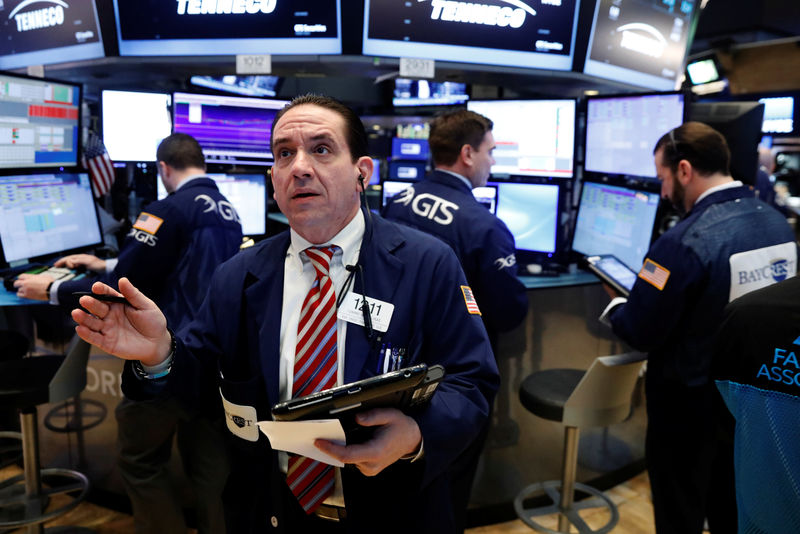By Chuck Mikolajczak and Noel Randewich
(Reuters) - Wall Street fell sharply on Tuesday as investors worried that President Donald Trump will struggle to deliver promised tax cuts that propelled the market to record highs in recent months, with nervousness increasing ahead of a key healthcare vote.
The S&P 500 and Dow Jones Industrial Average were on track for their worst one-day percentage drops since Trump's election victory in November.
The S&P financial index dropped 2.43 percent and was on track for the biggest daily fall since June. That added to losses in the sector since the Federal Reserve last week raised interest rates by 25 basis points and signaled it would remain on a gradual pace of hikes, a less aggressive stance than some investors expected.
Banks benefit from higher interest rates and their stocks are sensitive to changes in expectations of how quickly the Fed will change rates.
Bank of America (NYSE:BAC) slumped 5.07 percent, the biggest drag on the S&P 500, while a 2.7 percent drop in Goldman Sachs (NYSE:GS) pulled the Dow lower.
"There was a feeling the Fed was going to possibly be more hawkish last week. That didn't happen," said Mark Kepner, managing director at Themis Trading in Chatham, New Jersey. "That takes a little out of the higher rates that the banks want."
Benchmark 10-year U.S. Treasuries were last up 9/32 in price to yield 2.441 percent, the lowest yield since March 1.
Republican party leaders aim to move controversial healthcare legislation to the House floor for debate as early as Thursday. But they can only afford to lose about 20 votes from Republican ranks, or risk the bill failing, since minority Democrats are united against it.
With valuations stretched, investors see the Trump administration's recent struggles to push through the healthcare overhaul as a sign he may also face setbacks delivering promised corporate tax cuts. Expectations of those tax cuts are a major reason for the 10-percent surge in the S&P 500 since Trump's election in November.
"Republicans should have prioritized tax reform ahead of healthcare reform. They’re coming across as a motley crew rather than a party that can get things done," said Brian Jacobsen, chief portfolio strategist at Wells Fargo (NYSE:WFC) Funds Management in Menomonee Falls, Wisconsin.
The Russell 2000 index of smallcap stocks was down 2.03 percent, on pace for its worst day since September.
The financial sector has been the best performing of the 11 major S&P sectors since Trump's election, surging nearly 20 percent on his proposals to cut bank regulations and reduce taxes.
The Dow Jones Industrial Average was down 0.81 percent at 20,737.44 points, while the S&P 500 lost 0.88 percent to 2,352.6, on track for its fourth down session.
The Nasdaq Composite dropped 1.25 percent to 5,827.86.
The CBOE Volatility index, Wall Street's "fear gauge", jumped 10.3 percent.
Investors have grown concerned about elevated valuations, with stocks hovering near record highs for most of the month. The S&P 500 is trading at about 18 times forward earnings estimates against the long-term average of 15, according to Thomson Reuters data.
Declining issues outnumbered advancing ones on the NYSE by a 3.45-to-1 ratio; on Nasdaq, a 4.53-to-1 ratio favored decliners.
The S&P 500 posted 25 new 52-week highs and 6 new lows; the Nasdaq Composite recorded 73 new highs and 68 new lows.
